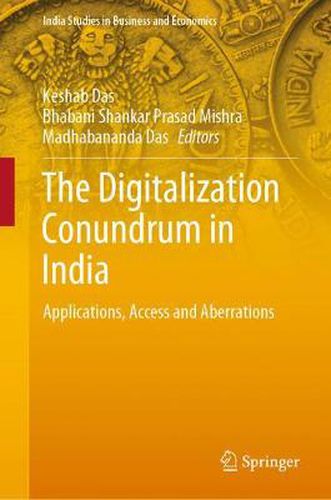Readings Newsletter
Become a Readings Member to make your shopping experience even easier.
Sign in or sign up for free!
You’re not far away from qualifying for FREE standard shipping within Australia
You’ve qualified for FREE standard shipping within Australia
The cart is loading…






This title is printed to order. This book may have been self-published. If so, we cannot guarantee the quality of the content. In the main most books will have gone through the editing process however some may not. We therefore suggest that you be aware of this before ordering this book. If in doubt check either the author or publisher’s details as we are unable to accept any returns unless they are faulty. Please contact us if you have any questions.
This book examines the nature, extent and implications of rapid strides digitalization has made in India since the turn of the millennium. These have been examined not merely in the sphere of information and communication technology (ICT) but its multifarious applications spreading across almost all aspects of production, services and institutions which have profound repercussions for the transformation of the society and economy at the micro, meso and macro levels. With contributions from both ICT scholars and social scientists, this book presents diverse scenarios and unravels challenges faced in the process of technical applications, access by the users of these disruptive technologies (automation, e-commerce, big data analytics & algorithms, artificial intelligence, cloud computing, etc.) which, unlike heavy machines (embodied technology), mostly defy physical space, pace of mobility and inoperability between technologies. Chapters in this volume address challenges and possibilities in establishing and operating intricate engineering infrastructure, technical and societal constraints encountered in broad-basing digitalization across layers of educational and social skills conducive to difficult geographies. Issues dealt within this book include farming, healthcare, education, food processing, e-commerce, labour, rural community development, open source data and information democracy. The chapters also reflect upon implications on local economy and society, of the very global nature of these seamless technologies where inter-operability remains the quintessential advantage of digitalization whether promoted or spearheaded through the state, private sector or global capital. The book critiques policy inadequacies and suggests plausible policy approaches to reduce the adverse impacts of fast digitalization and broad-base potential benefits across space and levels of socio-economic development of regions and society. This book would be of interest to scholars, practitioners, technocrats, industry analysts, policy makers and civil society agencies.
$9.00 standard shipping within Australia
FREE standard shipping within Australia for orders over $100.00
Express & International shipping calculated at checkout
This title is printed to order. This book may have been self-published. If so, we cannot guarantee the quality of the content. In the main most books will have gone through the editing process however some may not. We therefore suggest that you be aware of this before ordering this book. If in doubt check either the author or publisher’s details as we are unable to accept any returns unless they are faulty. Please contact us if you have any questions.
This book examines the nature, extent and implications of rapid strides digitalization has made in India since the turn of the millennium. These have been examined not merely in the sphere of information and communication technology (ICT) but its multifarious applications spreading across almost all aspects of production, services and institutions which have profound repercussions for the transformation of the society and economy at the micro, meso and macro levels. With contributions from both ICT scholars and social scientists, this book presents diverse scenarios and unravels challenges faced in the process of technical applications, access by the users of these disruptive technologies (automation, e-commerce, big data analytics & algorithms, artificial intelligence, cloud computing, etc.) which, unlike heavy machines (embodied technology), mostly defy physical space, pace of mobility and inoperability between technologies. Chapters in this volume address challenges and possibilities in establishing and operating intricate engineering infrastructure, technical and societal constraints encountered in broad-basing digitalization across layers of educational and social skills conducive to difficult geographies. Issues dealt within this book include farming, healthcare, education, food processing, e-commerce, labour, rural community development, open source data and information democracy. The chapters also reflect upon implications on local economy and society, of the very global nature of these seamless technologies where inter-operability remains the quintessential advantage of digitalization whether promoted or spearheaded through the state, private sector or global capital. The book critiques policy inadequacies and suggests plausible policy approaches to reduce the adverse impacts of fast digitalization and broad-base potential benefits across space and levels of socio-economic development of regions and society. This book would be of interest to scholars, practitioners, technocrats, industry analysts, policy makers and civil society agencies.